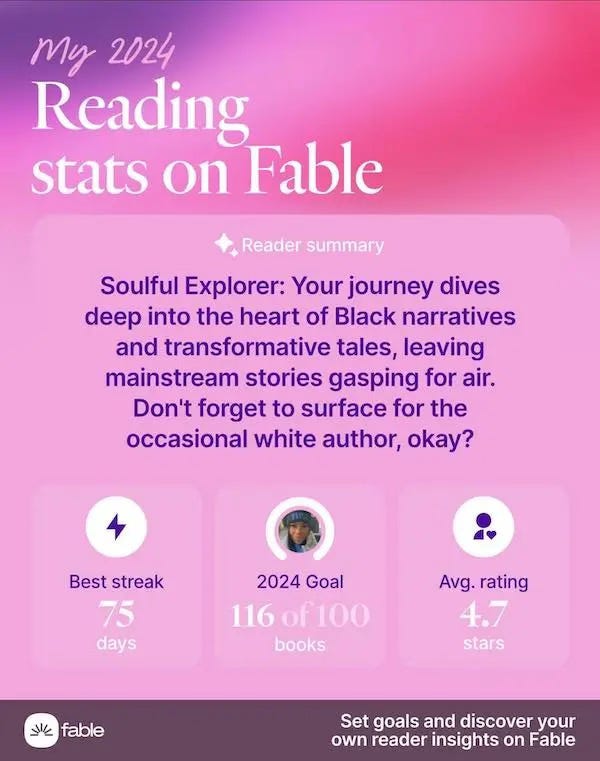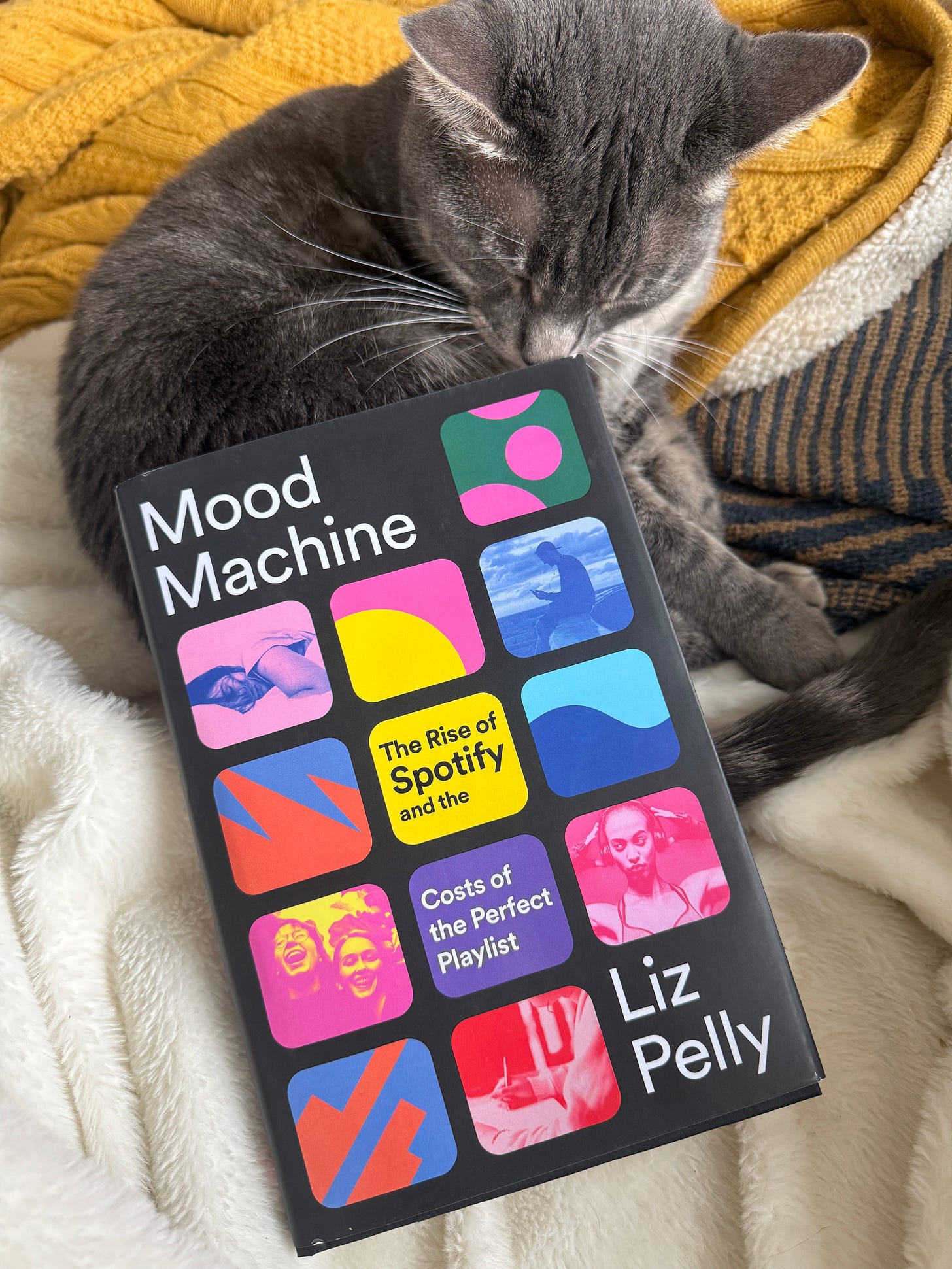A few years ago, Fable reached out to me about starting a book club. I’d let the internet know I was interested in starting a new book club for nonfiction readers, and companies sent me their pitch emails. I needed to make a little money in this new adventure to help with inflation and the loss of food stamps when the pandemic aid ended. Making an income as a book influencer has never come easy for those unwilling to spend half a day begging for scraps on Lives or unhappy with the prospects of making ads for books we know aren’t worth anyone’s time. A book club seemed like a nice product I could sell – here's my thoughts and questions, I hope it’s worth something. Many companies wrote telling me, that while a paycheck might be a little ambitious, I could become a founder of some start-up “doing incredible things for readers.” Fable was one of the few companies that had a potential to earn a little, but it only came through selling in-app e-books. A few dollars here and there wasn’t worth it. But I watched it grow with audiences sharing quirky, little graphics where they could admire their cute digital libraries and see numbers rack up and progress bars get closer to some terminus. I guess we’re all looking for some bit of comfort. You read that thing. You’re doing good. You’re a good person.
Last week their AI system placed the company in hot water when a year wrap-up graphic urged a its user Tiana Trammell, “Don’t forget to surface for the occasional white author, okay?” We’re here, living in our unrealities, watching an AI system and parents at school board meetings plead, in unison, “don’t forget white folks write books.” Fable said they’re trying to learn from this, and that its system’s “playfulness” settings have been pulled back
People have reacted to this AI bigotry with earnest pleas to their audience to pay more attention to the little AI symbol cropping up more and more – the spark (some have called it sparkle) icon signifying the parts of our digital realities created and dispensed from one of the rented out AI systems built by a litany of transnational tech conglomerates. Fable couldn’t find a way to pay its hosts that have made it one of the most successful reader apps, but they will always have money for the server space needed to give their CEO the warm fuzzies knowing her company is part of the birth of this new internet age.
A couple weeks ago I was sitting on an exercise bike reading Orbital. The book follows six astronauts flying around the earth, all of them reckoning with their internal struggles of a pastoral longing for and a not-fully articulated but deeply felt fear of the planet below. I had my headphones in noise cancellation mode while I peddled along to these space explores’ internal monologues. I listened to an instrumental playlist Apple generated for my journey. With my hamstrings tiring out, I went over to the treadmill to finish my workout while walking an incline and scrolling cat adoption pages.
Me and my partner have three cats. A fourth seems inevitable, our love for these animals not quite quenched for all it can be or driven to a point of regret. When I go to the pet store for weekly supplies of litter and food, I always stop by the cages to see if maybe it is time for that fourth cat. Spread around the store, paper posters meant to pull at the heartstrings ask the reader to, “adopt a new friend.” But on these posters, an AI cat’s cartoon eyes can’t speak to my soul. Right now, it would be hard to afford the cost of another cat, but the tipping point for discovering our perfect human-cat ratio balancing act isn’t going to have the scales tipped by the daunting chasm of this feline uncanny valley
Over the past few days, I’ve spent a lot of time looking out the window and watching the snow collect in Indianapolis. I moved here from north east Indiana, and the lack of snow here has always been hard to deal with as part of the trade in a better life. It’ll only get worse and more chaotic. Some winters won’t see an inch of snow until a calamitous event occurs – a storm rivaling the still talked about Blizzard of ’78 will happen, and happen again, soon enough. The gray drab eclipsed in a white flurried burst that’ll kill a few dozen people and melt away in 60 degrees in January. It’s all part of our future.
This morning, I’m switching back and forth between my TikTok algorithm sending me updates on the Pacific Palisades wildfire engulfing western Los Angeles and reading Mood Machine: The Rise of Spotify and the Costs of the Perfect Playlist. Listening to the new Ethel Cain album, I’m setting my own vibes as millions struggle to breathe from the smoke drifting across Santa Monica Bay.
Spotify was started by ad execs trying to find a new, fun way to get you to see more ads. Music, an afterthought. Don Draper isn’t smoking in the office trying to sell us a new enlightenment born out of the American Dream because we’ve already bought into our perfectly personalized world of playlists remixing the same fifty songs.
We are the afterthought of how capital can be accumulated. We are the system through which dollars can be harvested. The cats, the music, the books, the photoshoot out in the beautifully snow-covered forest – we are the testing ground for what AI systems we will tolerate enough for executives to shove down our throats.
The fire expands with the embers floating in the winds. A tiny flicker, a spark, engulfing and consuming everything in its path.
The spark is here, it’s all around us, and despite our disgust at its vacuous uselessness, we celebrate it for how it makes us feel human. The numbers on our wrapped tells us how we did this year, and that with a little more attention, how we can be better next year if we chose to consume more. Read a little more and tell them you’re a good little boy – so informed and so grounded in the moment. Listen a little more and let them tell you how you’re one of a kind – an amazingly brilliant soul from New Hampshire, a top 5% type of girlie that truly understands the essence of a your chaotic Brat Summer or Me Espresso trysts. You’re you, and they must tell you, so that way you know and believe your own uniqueness.
I’ll still log Mood Machine when I finish it. I’ll type up another essay while Dustin O’Halloran Essentials plays over the speakers. I’ll post a photo of my fourth cat and let the algorithm decide if and when you get to meet her. I’ll do this all while the data centers poison the drinking waters and the fires get closer to my home. I’ll feel safe in my own little, perfectly constructed digital world until I’m not






